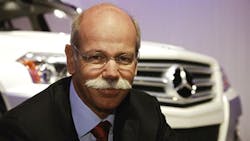Automakers Brace for Greater Scrutiny after Emissions Scandals
Carmakers have to be clearer about the way they certify their fuel-economy and emission ratings as regulators ramp up scrutiny over the gap between laboratory results and on-road conditions, according to Daimler AG Chief Executive Officer Dieter Zetsche.
“You can only be transparent and if there’s any shortfalls anywhere, fix them and move forward,” Zetsche told Bloomberg News ahead of the Beijing auto show opening this week. “And then of course it will take some time” for the industry to be where they were before the Frankfurt motor show last year.
Revelations that Volkswagen AG (IW 1000/7) cheated on diesel emissions emerged days after the Frankfurt exhibition last September. Since then, government fraud investigators have raided French manufacturer PSA Group as part of broader checks into vehicle emissions. In Japan, Mitsubishi Motors Corp. said last week it manipulated fuel-economy tests to mislead consumers.
Investigating Certification Process
Also last week, Daimler (IW 1000/15) said it had been asked by the U.S. Department of Justice to investigate the certification process of its cars. The internal probe follows U.S. class action suits that allege some of its cars violated emissions standards. Daimler has said it’s cooperating fully with authorities and that the suits are “baseless.”
The suits against Daimler say Mercedes-Benz clean-diesel models contain a device that causes the vehicles to violate U.S. emissions standards when run at cooler temperatures, making them less environmentally friendly than advertised. Specifically, the automaker was accused of using a device in its BlueTec cars to turn off a system meant to reduce polluting nitrogen oxides in its exhaust.
The U.S. Environmental Protection Agency also contacted Daimler earlier this year over the allegations, which Zetsche rejected in February as without merit. While Daimler has acknowledged the existence of a device, it says it’s legal and designed to protect the engine.
China's Tough Regulatory Regime
“Will scrutiny increase? I would say probably. Yeah absolutely,” Mike Manley, who heads Fiat Chrysler Automobiles NV’s Jeep brand, said at a briefing in Beijing. “The company has been fairly clear in terms of performance against the standards regardless of which market we are in.”
Going by the rules that are being proposed, China will be the toughest regulatory regime over the next five years, Ford Motor Co. Chief Executive Officer Mark Fields said on Saturday in Beijing, where the company showed the F-150 Raptor pickup truck. Public health and environmental concerns are driving the scrutiny, and the second-largest U.S. automaker would support China adopting on-road emissions testing measures passed by the European Union, he said.
China, home to the world’s biggest auto market with more than 24 million vehicles sold last year, is aiming to improve fuel economy by about a third in 2020 from 2014 levels to reduce carbon-dioxide emissions, in large part by pushing automakers to introduce exhaust-free electric vehicles to balance against their sales of gas-guzzling SUVs.
Legislation in China is world-class. No relaxed regulations in China.”— Hakan Samuelsson, Volvo Cars CEO
“It’s going to be tough,” said Hakan Samuelsson, Volvo Cars Chief Executive Officer. “Legislation in China is world-class. No relaxed regulations in China.”
Zetsche said that Daimler is “very active” in helping European authorities enhance and accelerate the definition of new testing cycles that give a close comparison between test and reality for fuel consumption.
“The same applies for the emissions,” he said at the sidelines of an event on Sunday to unveil the stretched Mercedes-Benz E-class. “We think that is one important element that you get more similarity there and the general public can understand better than today because there is less difference between what you measure outside and what you measure in the lab.”
Technology Complexity on the Rise
While testing real-world driving emissions will give a more realistic measurement, the move “will add to the technological complexity,” said Herbert Diess, who heads Volkswagen AG’s namesake brand. “Treating emissions is very complex, and there are different rules in many different countries. Today, emissions controls are about as expensive as the engine itself.”
Even then, the numbers achieved at proving grounds and during certification will always differ from what consumers get in real-world driving, according to Toyota Motor Corp.’s China chief, Hiroji Onishi. While the world’s largest automaker has engaged in no misconduct in meeting legal requirements, consumers will be carefully monitoring the difference, particularly with the hybrids it’s bringing to market promoted for their fuel efficiency, he said.
“We try to think on the actual usage of the vehicle and try to work in a way that will be helpful in the real world,” Onishi told reporters on Sunday. “There will always be a gap between these two figures.”
About the Author
Bloomberg
Licensed content from Bloomberg, copyright 2016.
